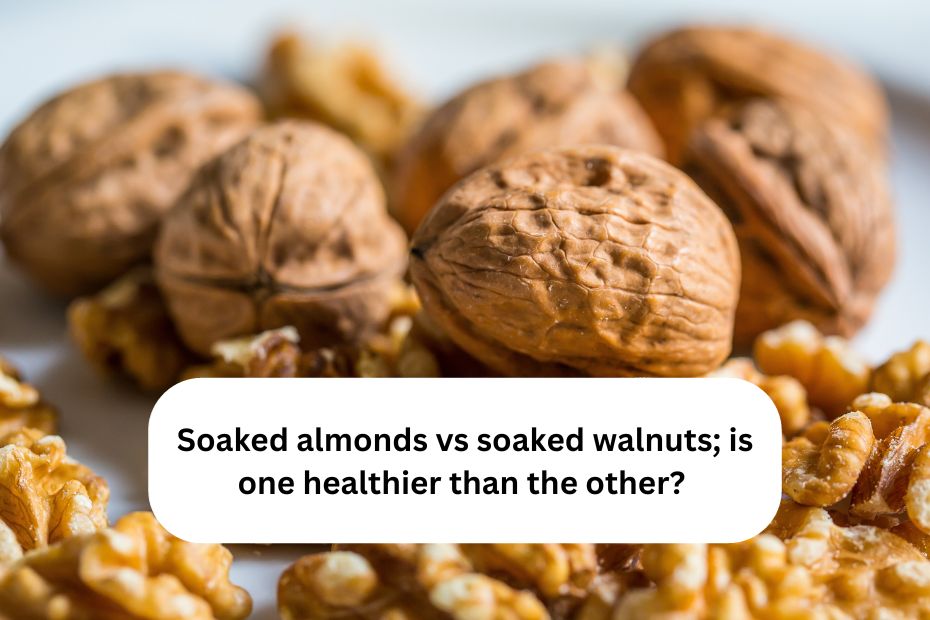Nuts have long been hailed as nutrient powerhouses, offering a plethora of health benefits. Among the various options available, almonds and walnuts stand out for their nutritional value. But when it comes to soaked almonds versus soaked walnuts, does one hold a distinct health advantage over the other? Let’s delve into the nutritional profiles and health benefits to uncover which might have an edge.
Understanding Soaked Almonds

Almonds, the seeds of the almond tree, are packed with essential nutrients. Soaked almonds are almonds that have been soaked in water for a period of time, typically overnight or for several hours. This process is believed to enhance their nutritional content and aid in digestion.
Nutritional Content: Soaked almonds retain a significant portion of their nutrients, including vitamin E, magnesium, protein, and healthy fats. The soaking process softens the almonds, making it easier for the body to absorb these nutrients.
Health Benefits:

- Improved Digestion: Soaking almonds helps reduce the enzyme inhibitor present in their skin, potentially aiding digestion and nutrient absorption.
- Enhanced Nutrient Absorption: The soaking process may make certain nutrients more bioavailable, such as vitamin E and antioxidants.
- Regulating Blood Sugar: Some studies suggest that soaked almonds might help regulate blood sugar levels due to their lower glycemic index compared to raw almonds.
Unveiling Soaked Walnuts

Walnuts are a nutrient-dense nut that are praised for their omega-3 fatty acids and as well as their numerous health advantages. Walnuts are noted for their distinctive look that resembles a brain. To prepare soaked walnuts, the nuts are submerged in water, which is a technique that is analogous to that of soaking almonds.
Nutritional Content: Soaked walnuts maintain their rich profile of omega-3 fatty acids, antioxidants, protein, fiber, and minerals like manganese and copper. Soaking walnuts can make the nutrients more accessible to the body.
Health Benefits:

- Heart Health: The omega-3 fatty acids in walnuts are associated with cardiovascular benefits, potentially reducing the risk of heart disease and improving cholesterol levels.
- Brain Health: Studies suggest that the antioxidants and omega-3s in walnuts may support brain health, potentially reducing the risk of cognitive decline.
- Anti-Inflammatory Properties: The antioxidants and healthy fats in soaked walnuts contribute to their anti-inflammatory properties, benefiting overall health.
Contrasting Health Benefits
When it comes to comparing the health benefits of soaked almonds and soaked walnuts, several factors set them apart.
1. Nutrient Composition: While both nuts are nutrient powerhouses, their profiles differ. Almonds are notably high in vitamin E and magnesium, while walnuts stand out for their omega-3 fatty acids. Each nut offers a unique set of vitamins, minerals, and antioxidants.
2. Digestive Benefits: Soaking almonds reduces the enzyme inhibitor in their skin, potentially aiding digestion. However, walnuts are not typically associated with enzyme inhibitors to the same extent as almonds, so the digestive benefits might not be as pronounced.
3. Omega-3 Fatty Acids: Walnuts are among the best plant-based sources of omega-3 fatty acids, specifically alpha-linolenic acid (ALA). These fatty acids play a crucial role in heart and brain health. While almonds contain healthy fats, they are not as rich in omega-3s as walnuts.
4. Blood Sugar Regulation: Soaked almonds have a lower glycemic index compared to raw almonds, which might help in regulating blood sugar levels. Walnuts also have a favorable impact on blood sugar due to their healthy fat content and fiber.
Making the Choice

Ultimately, the choice between soaked almonds and soaked walnuts boils down to personal preference and specific health goals.
1. Nutritional Goals: If you’re aiming to increase your intake of vitamin E and magnesium, soaked almonds might be a favorable choice. On the other hand, if you’re focused on obtaining more omega-3 fatty acids, soaked walnuts would be the better option.
2. Digestive Health: For individuals seeking digestive benefits, soaked almonds might be more beneficial due to the reduction of enzyme inhibitors, potentially aiding in digestion and nutrient absorption.
3. Heart and Brain Health: Both nuts offer advantages for cardiovascular health, but walnuts, with their omega-3 content, might have a slight edge. Likewise, for brain health, the omega-3s and antioxidants in walnuts are particularly advantageous.
4. Taste and Culinary Use: Personal taste preferences and culinary uses also play a role. Some might prefer the slightly sweeter taste of almonds in various recipes, while others might favor the richer, nutty flavor of walnuts.
Conclusion
In the debate between soaked almonds and soaked walnuts, both nuts emerge as nutritional powerhouses, each with its unique set of health benefits. Whether you choose soaked almonds for their vitamin E and digestive aid or soaked walnuts for their omega-3 fatty acids and brain-boosting potential, incorporating a variety of nuts into your diet can contribute significantly to overall health and well-being.






